Zagreb City Administration Has More Employees Than That of London
A look at the Zagreb city administration and just how many needless individuals it employs instead of boldly stepping forward into digitisation, you know, like the rest of the developed world in the 21st century.
Croatia is famous for many things. From the sparkling Adriatic sea to the glorious landscapes, to the food, the warm hospitality of the people to great minds like Nikola Tesla and Slavoljub Penkala. All of these positives make for an excellent impression of a gorgeous country that produces talent across all fields, from Luka Modric and the sporting world to Oliver Dragojevic and the musical one. One other thing it is famous for (or perhaps it is better to say infamous) to those of us who live and work here, is its masochistic love of paper, stamps, and providing job positions to blood suckers who enjoy watching people pointlessly wait in lines.
Let's look at another European country. It's a little further north on the map, it's a bit more rainy, the food can be a bit grim, and it is made up of four constituent countries, England, Wales, Scotland and Northern Ireland. Equally famed for its beauty and talent, from its rolling green hills and wild beaches to William Shakepeare and David Beckham, the United Kingdom is home to one of the most expensive cities in all of Europe, and one of the financial centres of the planet - the City of London.
Zagreb boasts a population of just under one million. London boasts a population of almost nine million, more than the entire population of Croatia, much less its capital. One would imagine London's city administration operations to be vast and complicated. One might expect this entity to be a machine that employs countless people, all yelling and throwing paper around. Quite on the contrary, unlike that of Zagreb.
As Poslovni Dnevnik writes on the 24th of April, 2020, the City of London publishes a workforce report every six months. As Faktograf reports, according to that document, at the end of September last year, 1074 employees were employed in the City Administration in London, with 97 agency workers working for the City Administration.
The Zagreb city administration currently employs around 3,200 civil servants and state employees. One must ask why a city of less than one million residents needs 3000+ city administration employees. What on earth is their purpose? One must also ask why Croatia is continuing to so fiercely resist the process of digitisation. It has to be admitted that the coronavirus crisis we're currently in the middle of has forced the country into the 21st century, but without the pandemic, very many things would have remained exactly the same.
Waiting in long lines grasping handfulls of documents and photocopies of them, not even being looked at until you show your ID card, being yelled at by poorly trained employees who know they won't lose their jobs no matter how unacceptably they behave and needing to take entire days off work much to employers' dismay just for the pleasure of it is the Croatian norm. At least it has been until the anti-epidemic measures came into force. But will it continue to be? Will this unprecedented situation be a desperately needed learning curve?
It will be interesting to see just how much Croatia takes from this pandemic when it is all over. Will the country begin to understand that an EU country should not be operating in such a fashion anymore? More importantly, will city administration employees, tax office employees and others across the vast spectrum of the nation's administrative, uhljebic culture finally begin to realise that those computers in their offices serve for more than just playing Angry Birds and Solitaire?
Maybe. But probably not.
For more, follow our lifestyle page.
Webcam Stats: Most Attended, Socially Distanced Za Krizen Ever?
April 24, 2020 - The final word on Za Krizen 2020, as the webcam stats show how truly international this year's attendance was - the most popular, most socially distanced Za Krizen of all time?
The final chapter in TCN's extensive coverage of the 2020 Za Krizen religious procession on Hvar - the attendance report, with some clues from the webcam stats of two cameras installed for the procession.
In 1943, this 500-year-old UNESCO procession almost did not take place due to the wartime occupation of the Italian fascists. In 1944, it took place in a refugee camp in the Sinai Desert in Egypt. The biggest threat to the continuity of a procession which is almost part of the genetic makeup of the people of Hvar came in 2020, however - coronavirus.
As already covered on TCN (check out the Za Krizen reports here), permission for the procession to go ahead was given for just 15 people per procession, a far cry from the hundreds if not thousands who traditionally follow each of the six Maundy Thursday processions through the night in Jelsa, Pitve, Vrisnik, Svirce, Vrbanj and Vrboska.
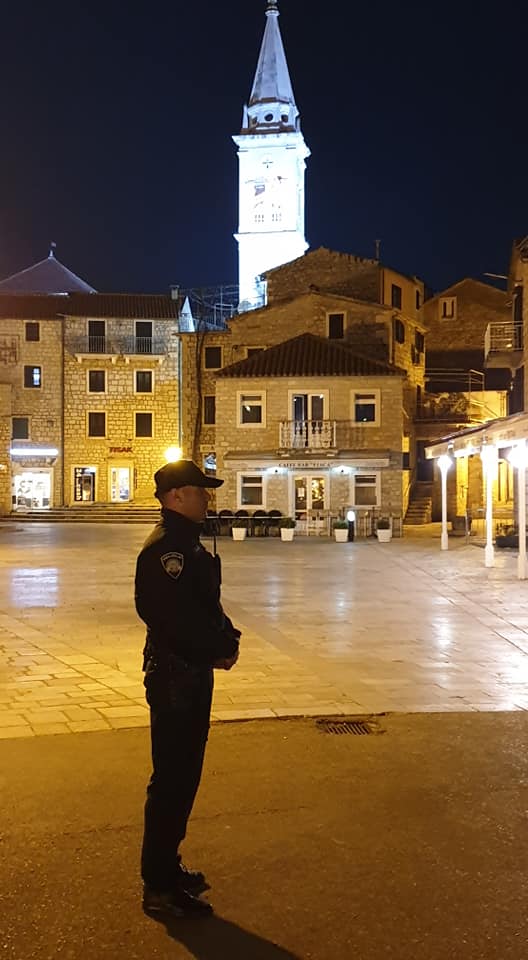
And the Hvar police made sure that the procession would go ahead with strict controls. As one of the few people fortunate enough to get a permit to cover the event, I tried to capture as much of the evening as possible for others - and my eye-witness account was very different to second-hand reports that appeared elsewhere in the media - you can learn more in Za Krizen 2020, Croatia Not Wuhan & Cabin Fever Perspectives.
It was a very strange night, but help was at hand for those who could not attend this year's procession, in the shape of a charismatic Hvar postman and an Austrian sitting at home in Graz.
TCN regulars will be familiar with Tomislav Zupan, my favourite postman on Hvar, who gave a legendary insight into life as a postman on a Dalmatian island a few years ago. It remains my favourite interview on TCN.
Tomi is blessed with the best terrace in the world to watch events on the main square in Jelsa, and he was very kind to keep the beers cold for the 2Cellos concert a few years ago. No doubt over a cold one, he came up with the idea to put some webcams in on his terrace and in the main Jelsa church for Za Krizen, together with his lifelong friend Jean-Pierre from Austria, who has visited Jelsa every year since 1974 - even during the war - and already operates two webcams in Jelsa.
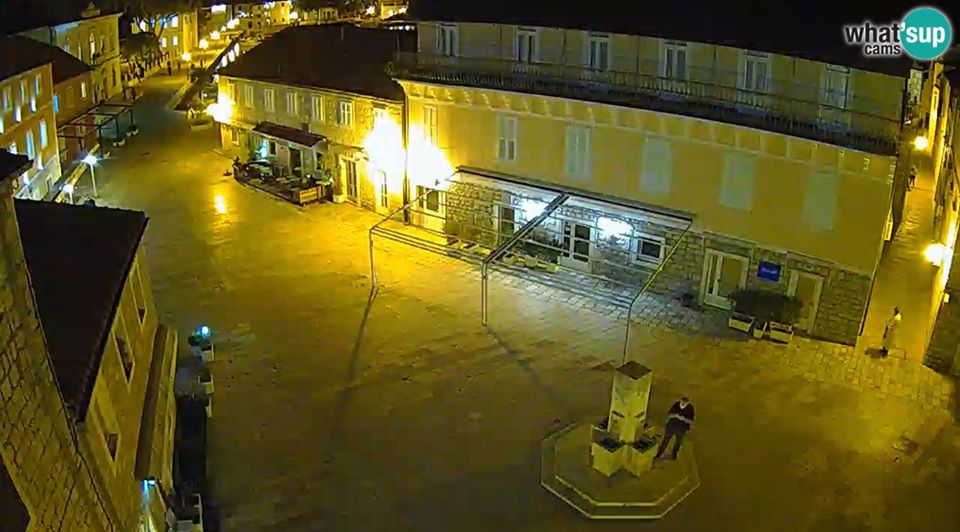
And so it was that at 22:03, the time that Za Krizen was about to start, Tomi and Jean-Pierre's webcam recorded the rather unusual sight of a totally empty main square.
Except for me.
So how many people tuned in to Za Krizen 2020? It was announced through various channels, and TCN FB carried it live with a pinned post. The answer is that we don't quite know the full story, but what we can report from the webcam stats from the church as the procession was starting was that there were 7,356 people watching when the server crashed.
To put that number in context, there are normally between 1,000 and 3,000 people taking part in the Jelsa procession.
But in the weird year of 2020, with only 15 participants and 4 journalists recording the event, it was attended virtually by a record number of people.
And the webcam stats show us just how international this year's event was.
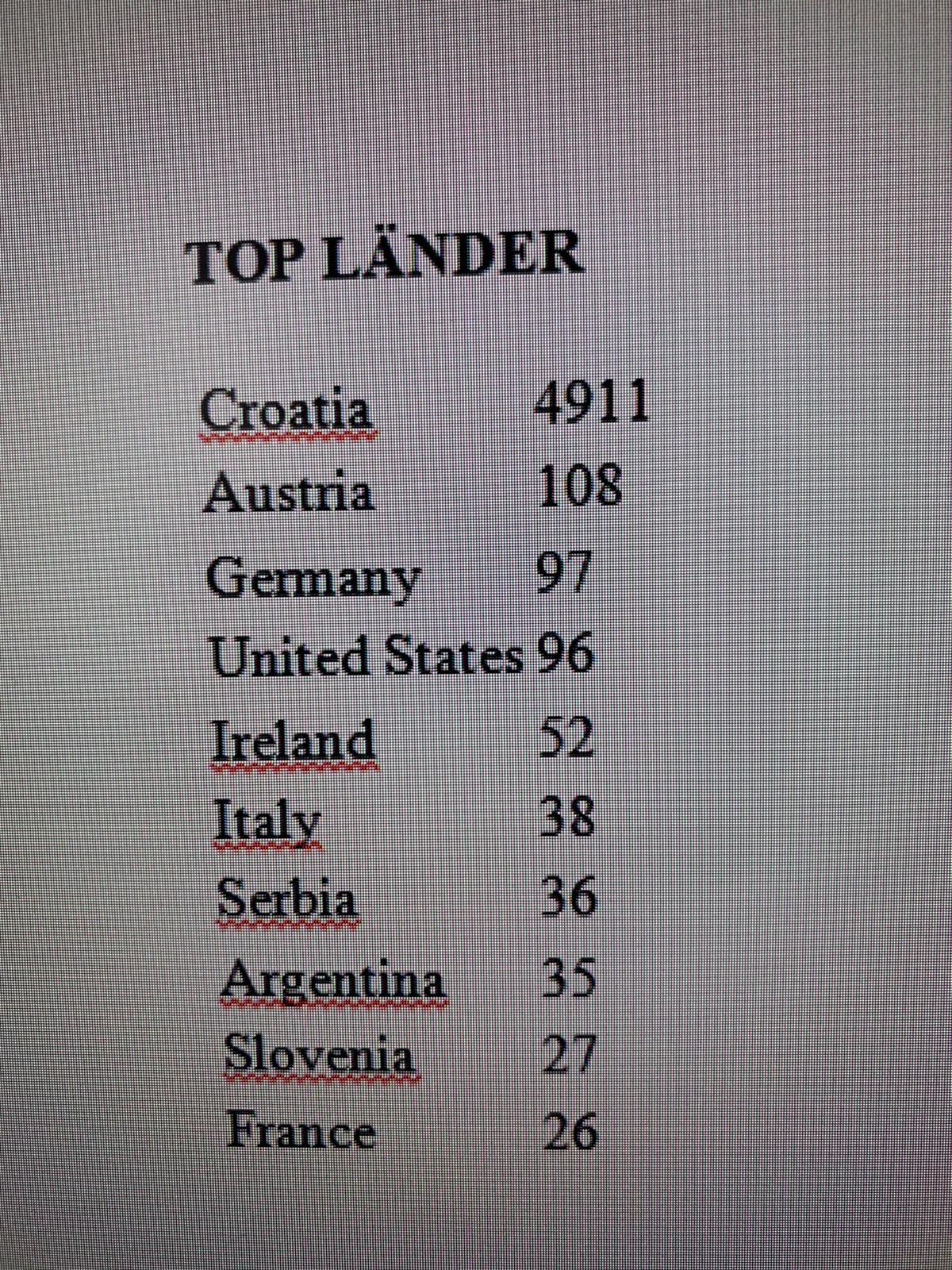
Here are some stats from the church on the Thursday night from a 3-minute period.
Quite an international gathering, isn't it?
I asked our webcam heroes if they had a more detailed breakdown of the number in Croatia to give us an idea perhaps how many people from Jelsa had stayed home and were watching via webcam. The breakdown was interesting.
Zagreb - 2,430
Split - 786
Jelsa - 697
Zadar - 235
Sibenik - 232
Hvar - 124
Rijeka - 123
Other - 284
It should be remembered that these stats were for a 3-minute period in the church on Thursday night.
By Friday morning, the main square webcam had recorded more than 46,000 visits.
And here, if you missed it, was the dramatic ending.
Tomi, Jean-Pierre, MANY thanks for your great efforts. It meant a lot for so many people all over the world, and you truly delivered the most attended, most socially distanced Za Krizen procession in its 500-year history.
To learn more about Za Krizen, check out the dedicated TCN section dating all the way back to 2011.
MPs Harshly Respond to Statements by 2 MPs on Ethnic Minorities
ZAGREB, April 24, 2020 - During a parliamentary debate on the implementation of the constitutional law on ethnic minority rights in 2018 on Friday, SDP lawmaker Gordan Maras and independent MP Mario Vučetić accused MPs Miro Bulj and Hrvoje Zekanović of spreading intolerance and hatred.
Vučetić and Maras said that citizens were fed up with attempts by individuals to parasitise on ethnic minorities and on negative context.
Those who spread intolerance and hatred do not wish good for Croatia, and stupid nationalists are in favour of a model of governing like that in Serbia, they said in response to previous statements made by Bulj and Zekanović.
Bulj, a parliamentary deputy of the MOST party, said that ethnic minorities in Croatia were exercising their rights to a great extent, however, this was not the case with ethnic Croats in Serbia who were, he said, exposed to mobbing.
Bulj raised the question of reciprocity considering the respective minorities in Croatia and Serbia. In that context he recalled that ethnic Serbs have three seats allotted to them in the Sabor, on the other hand there was no allotted seat for Croats in Serbia.
Furthermore, Serbia sets aside one kuna per each member of the ethnic Croat community, while Croatia allocates 37 kuna for each member of the ethnic Serb community, he added.
Zekanović of the Sovereigntists Party, wondered whether the Serb National Council would be included in efforts to take on the burden of the corona crisis considering austerity measures, and in that context he raised the question whether millions of kuna would still be allocated to "that and other associations that spread hate speech."
He went on to say that although ethnic minorities are a benefit for Croatia's society, he insisted that it should not be forgotten that members of an ethnic minority took up arms against Croatia 30 years ago.
"We have not heard the leader of that minority offering a sincere apology," he said accusing the current government of being "a Croat-Serb-Roma coalition."
The parliamentary deputy of the Czech and Slovak minorities, Vladimir Bilek, responded that minorities should be seen as bridges between Croatia and other countries.
He said that in the past few years, Czechia and Slovakia had provided some 25 million kuna for infrastructure investments in Croatia.
Ante Babić of the ruling Croatian Democratic Union (HDZ) said that Croatia was investing efforts to make sure that the status of ethnic Croats in Serbia could be improved. We would like their status to be improved, however that also depends on the other side, Babić said.
Public Administration Minister Ivan Malenica said that in 2018, a total of 173 million kuna was spent on the implementation of the law on ethnic minority rights, 29 million kuna more than in 2017.
More news about national minorities in Croatia can be found in the Politics section.
IRB: Genetic Sequence of the COVID-19 Virus Genome Determined
ZAGREB, April 24, 2020 - An interdisciplinary team of Croatian scientists has determined the genetic sequence of the COVID-19 virus genome, which will make it possible to determine the source of the infection in Croatia and track it as well as contribute to global efforts to curb the pandemic.
The Zagreb-based Ruđer Bošković Institute (IRB) said in a statement that this was a joint success of its researchers and those working at the Rijeka School of Medicine and the Teaching Institute for Public Health.
The success confirms that Croatia has both the technical and human resources that place it along other countries contributing to the understanding of the SARS-CoV-2 virus.
The first detailed analysis of the virus genome was done at the IRB Laboratory for Advanced Genomics, led by Oliver Vugrek.
Participating in the project were also Igor Jurak of the Rijeka University Department for Biotechnology and Tomislav Rukavina and Neven Sučić of the Rijeka School of Medicine and Teaching Institute for Public Health.
Their results have helped develop an own protocol for the analysis of the COVID-19 disease, which could be applied broadly in the analysis of other viruses too, the IRB said.
More coronavirus news can be found in the Lifestyle section.
COVID-19 Epidemic Points to Importance of Multilateralism
ZAGREB, April 24, 2020 - Croatia is a strong advocate of multilateralism whose importance has been confirmed during the novel coronavirus epidemic, the Croatian Ministry of Foreign and European Affairs said on Friday on International Day of Multilateralism and Diplomacy for Peace, marked April 24.
The UN General Assembly decided in December 2018 to declare 24 April as the International Day of Multilateralism and Diplomacy for Peace.
Croatia joined the Alliance for Multilateralism in 2019 which was launched by Germany and France.
"There are numerous issues and challenges that countries around the world need to approach jointly, like climate change, sustainable development, geo-political tensions, international terrorism, hybrid threats and the like," the ministry said in a press release.
"The current COVID-19 epidemic undoubtedly points out the importance of jointly facing an exceptional complex phenomenon through multalateralism and diplomatic efforts," the ministry said in its press release.
Official Zagreb considers that it is necessary to work together on advancing mechanisms in international organisations particularly the United Nations, in an effort to improve their efficiency and to secure collective health, well-being, security and development.
More foreign policy news can be found in the Politics section.
Butković Rules Out Seasonal Increase in Motorway Toll Prices
ZAGREB, April 24, 2020 - Transport and Infrastructure Minister Oleg Butković said on Friday that this summer there would be no seasonal increase in motorway toll prices.
While touring the construction works at a section of the Istrian Y motorway, Butković also hinted at the possibility of lowering the motorway toll tariffs for Croatian nationals.
"We are considering a model whereby we and the tourist sector could encourage local people to go on holidays this summer. Therefore, the price of motorway tolls could be lower. However, we will decide on that in due course," said Butković.
Commenting on the government's plan to phase out the coronavirus containment measures, which would include the gradual restoration of public transport services, Butković said that epidemiologists would define rules for passengers using public transport.
Wearing protective masks will be obligatory and social distancing measures will have to be obeyed. Buses and trains will probably allow a smaller number of passengers.
Butković announced the reintroduction of flight services twice a day between Zagreb and Split and Zagreb and Dubrovnik as of 11 May.
The question mark remains over the re-establishment of international air transport, according to the minister.
More transport news can be found in the Travel section.
Lockdown at the Quaich Experience: A Scottish View from Hvar
How does a Scottish lockdown on Hvar look? The view from the Quaich Experience in Vrbanj through the eyes of owner Chris Connor.
Mick and I left the UK in 2009 and created The Quaich from an old ruin which had not been lived in since WW1II, the Quaich Experience. With hindsight I’m not sure I would do it again but we finished up with not a bad place to spend this recent lockdown! I know our children are happy we are here on Hvar rather than back in UK at this time. But how I miss them!
Vrbanj is a very quiet little village even during normal times so at the moment we are grateful to hear a donkey heehaw or even a dog bark. Thankfully our little village shop is open and we have been allowed to travel within our ‘Opcina’ area which is Stari Grad so the Big Tommy has been our go to for food and gin!
On my worst days I cry and mope about but a FaceTime with my grandchildren always picks me up again and of course my Mick who is always ‘splendid’ bless him. My rock. Normally at this time I would be flying back to Sussex to spend time with my little family but alas……….
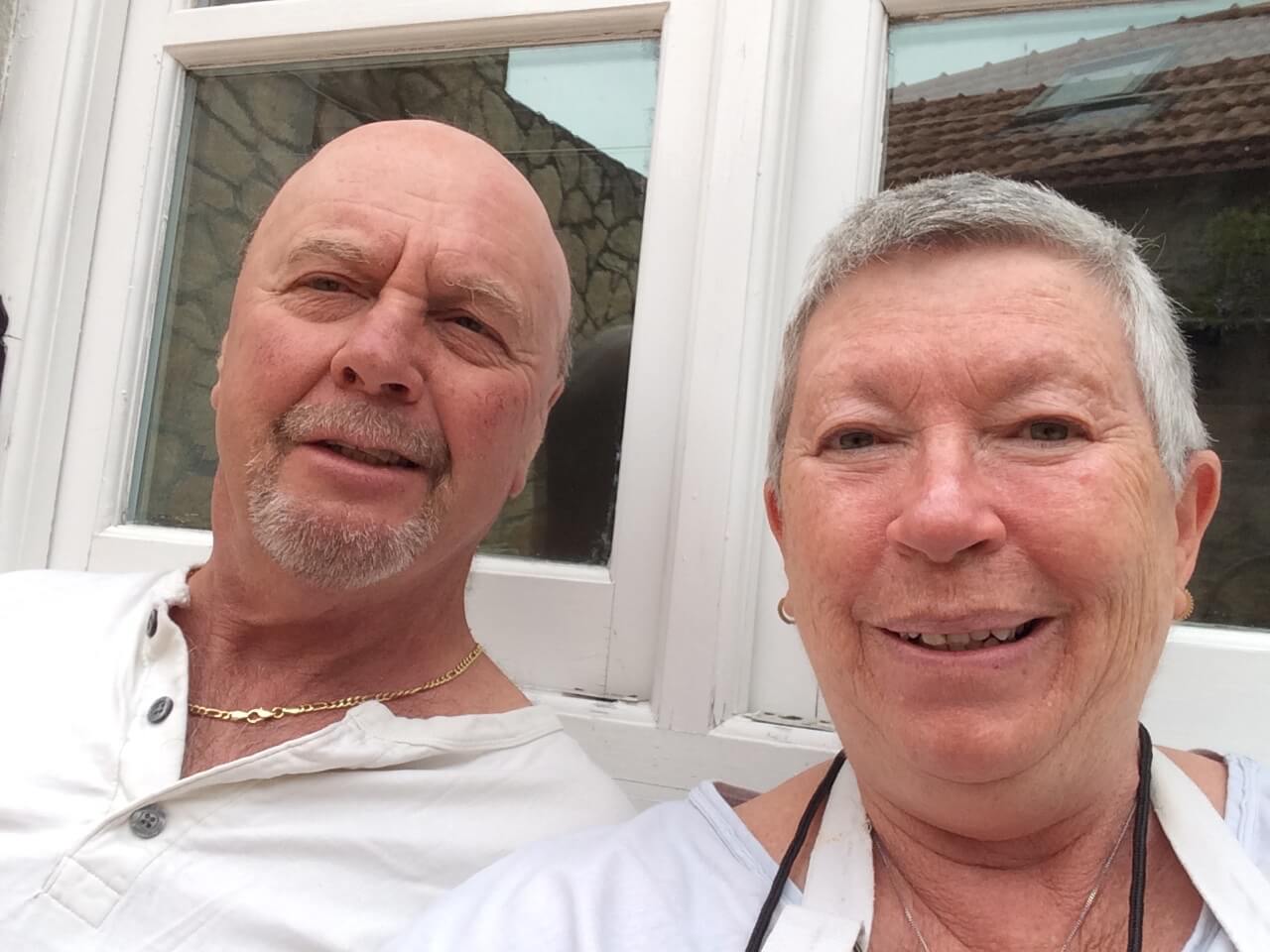
I was a little too late to get to the Frizzer (hairdresser) before the lockdown so in a moment of rashness allowed Mick to shave my head. After two weeks it’s starting to look not bad. For a while I did resemble Ian Beale from Eastenders!
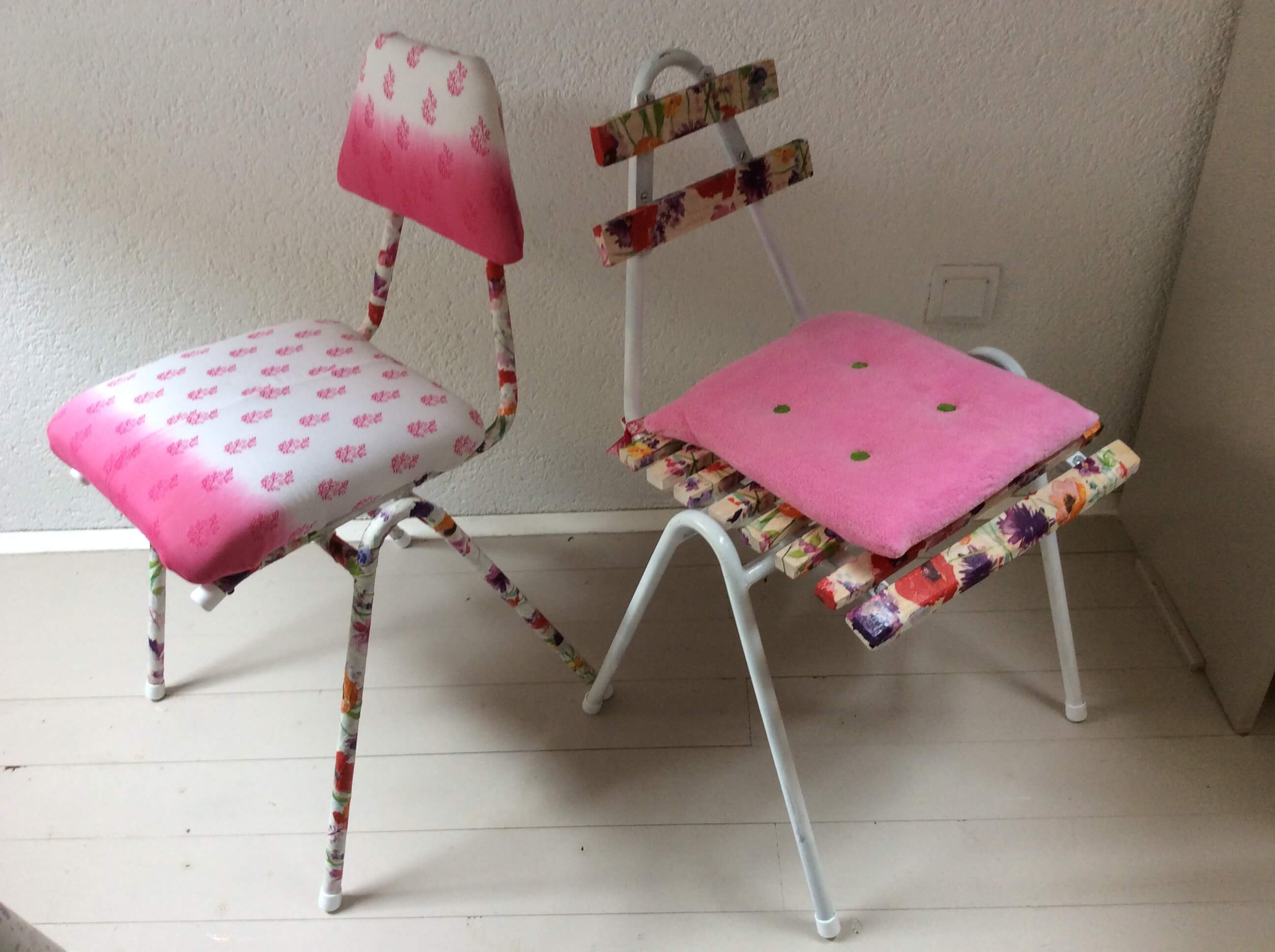
We are not the kind of folk who can watch endless Netflix or daytime TV so finding projects to keep us busy has been a challenge. It started with renovating the odd chair we would find at the bins but we have now moved on to making toys for the grandchildren from old timber! On wet days (not had many of them) jigsaw puzzles and knitting for me and Mick is still able to find some old football matches or rugby.

All in all we are doing OK although must admit not looking forward to the humid nights and the mozzies!
We have had a lot of cancellations but still hopeful for July when we still have some guests booked in and as we have all this spare time The Quaich is looking pristine and ready to welcome guests as and when. We rely on the income we receive during the summer months to get us through the winter so the future for us is a little uncertain financially but heyho! a day at a time for now.
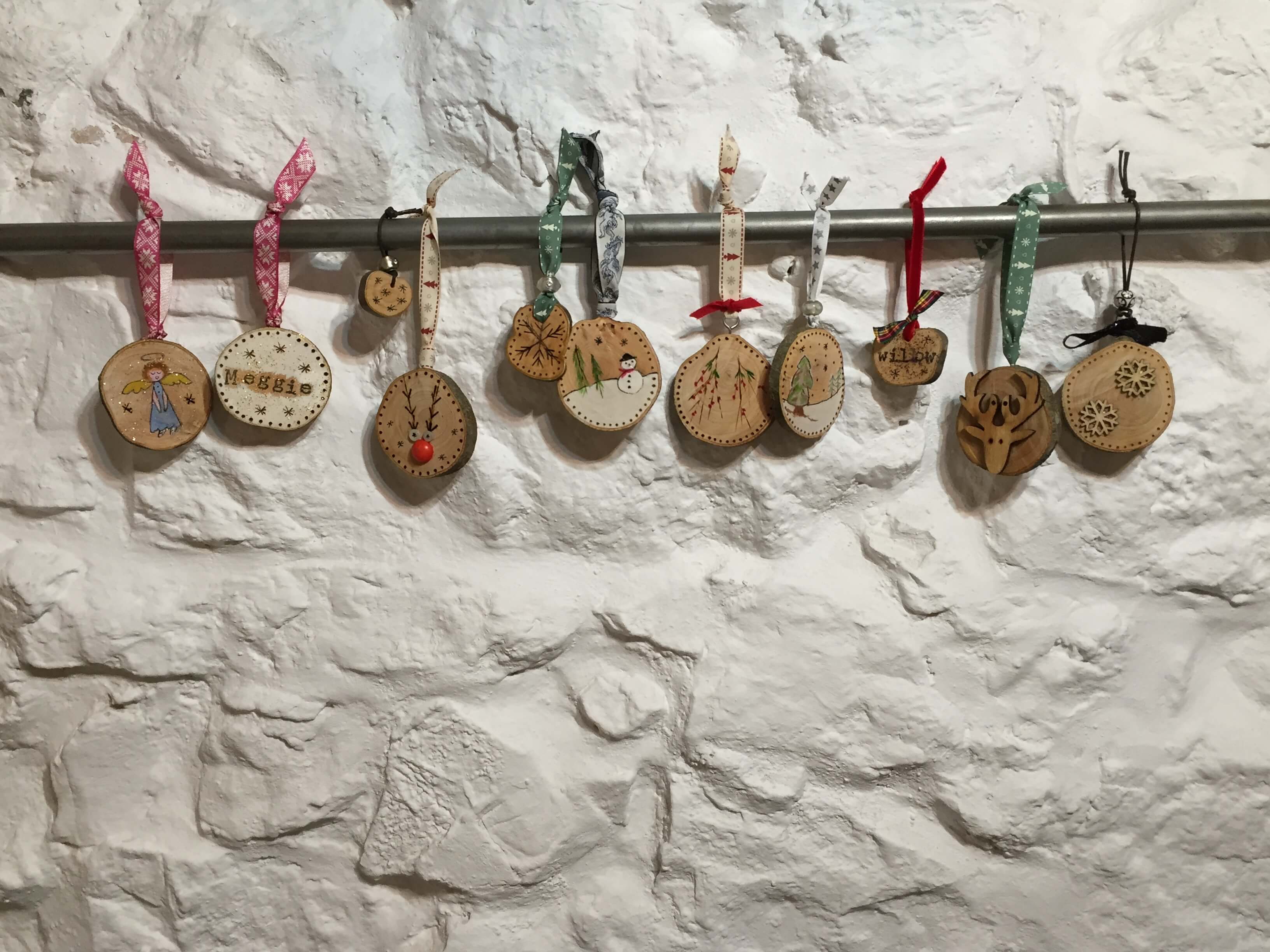
Turning our thoughts to the future we realise that the very personal service we have provided at The Quaich will have to be toned down as I believe guests will be very cautious about leaving home for some time to come. Fortunately, we can be very adaptable in that respect - the cottages are all self-catering with lock boxes for keys so no need to have contact with us at all if that is what they prefer. Information regarding swimming pools is quite clear in that the normal chemicals used to keep water healthy will kill the coronavirus. Staying within the area of The Quaich can be like an isolation in itself and maybe for the future, guests may be looking for longer-term rentals. We can either stock up groceries for them or I think driving to us and bringing their own goods will become more the norm.
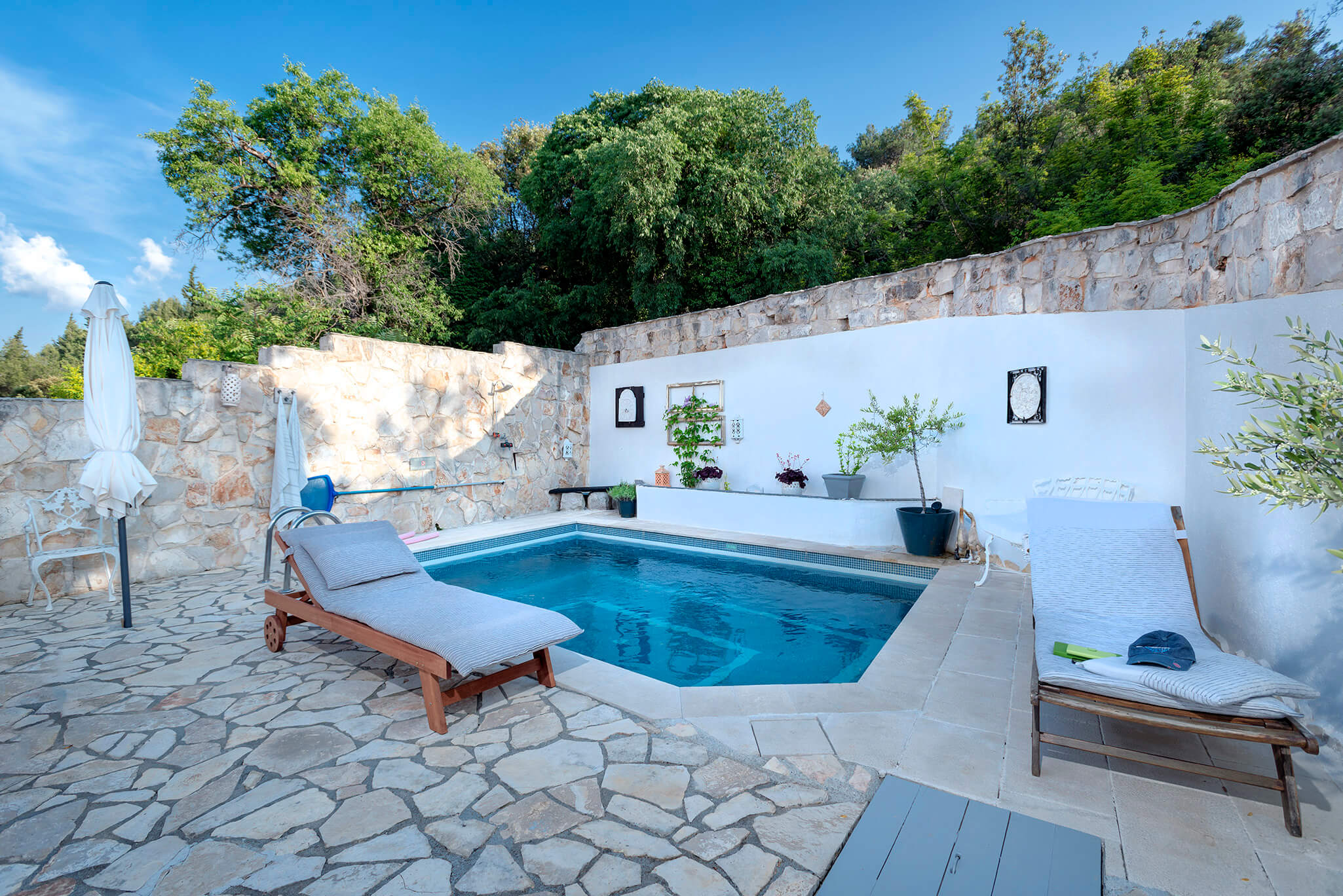
For those of you who know Mick and I and The Quaich, you will know that in the past couple of years we have been for sale. This is still the case for us. We have enjoyed our time here immensely but for me especially, it’s time to go home. Maybe our lifestyle here, whether as a holiday home or as a permanent home, will be far more appealing once the world gets back to some sort of normality. After all this is paradise and until we sell we are still welcoming guests.
Do you remember Terry Waite. He spent 1763 days as a hostage in appalling conditions.
He just told us all to stop complaining!
Change your mindset he said, you're not STUCK at home, you're SAFE at home
His advice:
*Keep your own dignity - get out of your PJs!
*Form a structure for the day
*Be grateful for what you have - shelter, home, possessions
*Read and be creative
Stay safe everyone xx
TCN-ova Virtualna Hrvatska – inovativna besplatna promocija hrvatskog turizma u vrijeme pandemije koronavirusa
PRIOPĆENJE ZA MEDIJE Hvar, 24. travnja 2020.
TCN-ova Virtualna Hrvatska – inovativna besplatna promocija hrvatskog turizma u vrijeme pandemije koronavirusa
Total Croatia News - najčitaniji hrvatski portal s vijestima na engleskom jeziku ponovno postavlja trendove u turističkoj promociji naše zemlje i kroz svoju Virtualnu Hrvatsku nudi svim turističkim zajednicama besplatnu platformu kojom dosežu desetke tisuća posjetitelja dnevno.
Sa željom da u ovom neizvjesnom razdoblju pandemije i ove sezone privuče što više turista u Hrvatsku, poznati hrvatski bloger Paul Bradbury pokrenuo je kampanju Virtualna Hrvatska, projekt koji na jednom mjestu okuplja lokalne turističke zajednice s ciljem virtualne promocije domaćih destinacija sada, kako bi ih kasnije pretvorile u stvarne posjete u sezoni. Najčitaniji hrvatski portal na engleskom jeziku, Total Croatia News, turistima omogućuje da iz udobnosti svoga doma istražuju lijepu našu i unaprijed isplaniraju koje će lokacije uskoro posjetiti, pridružujući se tako turističkim destinacijama diljem svijeta koje osmišljavaju nove poslovne strategije suočene s novom realnošću koronavirusa.
Vlasnik portala, čije tekstove godišnje čita više od tri milijuna korisnika, smatra kako vremena za gubljenje nema.
„Nikad nije bilo boljeg vremena za strateško promoviranje turizma, jer dvije su stvari sigurne - ljudi i dalje imaju očajničku želju za putovanjem (a što je bolje od hrvatske plaže jednom kad sve ovo završi, koja je k tomu jako blizu za sve one koji u Hrvatsku mogu doći automobilima?) i upravo sada imaju jako puno vremena dobro istražiti kamo žele pobjeći i putovati čim im se ukaže prva prilika. A ta je kombinacija izuzetno dobra za promociju turizma. Trenutačno imamo prilike vidjeti mnoge turističke kampanje diljem svijeta, koje prikazuju primamljive destinacije uz poruke poput Ostanite kod kuće, putujte kasnije. Takve su poruke sasvim razumne i dobrodošle, no ne daju onaj dodatni impuls koji stvara stvarnu želju za putovanjem“, kaže Bradbury.
Kampanja je zamišljena kao serija članaka o destinacijama diljem Hrvatske, koji će budućim turistima pružiti više informacija o pojedinoj lokaciji, ali i priliku za virtualno istraživanje i zaljubljivanje u nju, sve dok ponovno ne budu mogli putovati. Dva članka već su i objavljena, a promoviraju virtualne ture i planiranje posjeta Zagrebu https://bit.ly/VirtualZagreb i Hvaru https://bit.ly/VirtualHvar.
Paul Bradbury poziva sve lokalne turističke zajednice da se udruže s njim i pošalju mu sve online promotivne materijale i priče o svojim destinacijama, a on će ih objaviti potpuno besplatno na svom portalu i tako predstaviti najbolje od naše zemlje turistima diljem svijeta. Te priče se potom mogu dijeliti svim kanalima kojima turističke zajednice raspolažu.
"Lokalne turističke zajednice najbolje poznaju svoje destinacije i imaju dostupne promotivne materijale, a uz podršku Total Croatia Newsa, hrvatske će destinacije obići svijet. Malo po malo, mislim da bismo zajedničkim snagama mogli učiniti puno za ovu, još neizvjesnu, turističku sezonu“, kaže Bradbury.
Svi zainteresirani mogu poslati svoje materijale na e-mail This email address is being protected from spambots. You need JavaScript enabled to view it., pod nazivom Virtualna Hrvatska i dodati naziv odredišta (primjerice Virtualna Hrvatska Split) s linkovima na sve dostupne online materijale.
Paul Bradbury irski je pisac i bloger koji u Hrvatskoj živi od 2002. godine. Dobitnik je turističke novinarske nagrade FIJET Marco Polo 2014. te vodi i uređuje najveći i najposjećeniji hrvatski portal vijesti na engleskom jeziku Total Croatia News, koji nosi pridjev "najpouzdanijeg izvora informacija o hrvatskim destinacijama na svijetu". Za portal pišu i brojni domaći stručnjaci i analitičari, a o njegovu uspjehu govori činjenica da ga kao izvor vijesti iz Hrvatske koriste brojni ugledni svjetski mediji poput Huff Posta, Washington Posta, Guardiana, Independenta, Süddeutsche Zeitunga, Die Zeita, New Scientista, Heralda, Lonely Planet Newsa i brojnih drugih. Više o portalu TCN pronađite na www.total-croatia-news.com.
****
Jelsa, Hvar - April 24, 2020 There has never been a better time to promote tourism strategically, says Total Croatia News CEO Paul Bradbury, who is offering free help to any local Croatian tourist board who wants it.
Meeting Between Unions, Government Ends, Negotiations to Follow
ZAGREB, April 24, 2020 - Trade unions representing public and civil servants on Thursday wrapped up consultations with government representatives with the conclusion that official negotiations on salaries and basic collective agreements would follow, due to the economic crisis caused by the coronavirus pandemic.
"We talked about the economic and health safety situation in light of the coronavirus pandemic. We exchanged opinions on how we see certain government measures and their effects. Official negotiations will follow. We expect to.... agree on solutions to all financial challenges the government is facing, which will be to the satisfaction of employees," Labour and Pension System Minister Josip Aladrović said after a three-hour meeting.
Aladrović said that for the time being he "would not dare say" that pay cuts were necessary.
"During the entire meeting the word 'cuts' was never mentioned. We have to put the benefits of state and public servants on the table and talk about them. I am hoping for a certain consensus," Aladrović said.
The minister also said what would happen with a recently agreed increase in the wage index for education employees.
"That was not on the table today. However, I am confident that during the negotiations we will open that issue," Aladrović said.
Union representative Vilim Ribić underscored that if something was necessary, it should not be called solidarity but necessity.
"I would not say that there was understanding at the meeting, rather polemics and opposite opinions. There was a lot of discussion about the economic purpose of salaries in the state and public sector. Our opinions on the issue were opposite. We also discussed when these interventions will take place and who will be affected by them," Ribić said.
He warned that none of the EU countries was cutting salaries at the moment and that all economic experts said pay cuts would be counterproductive. "Even the Croatian National Bank governor has said that now is not the right time," Ribić said.
More economy news can be found in the Business section.
Zagreb Summit of EU and 6 Balkan Countries to Be Held Online on 6 May
ZAGREB, April 24, 2020 - A summit meeting of EU member-states and six Western Balkan countries will be held online on May 6, the Croatian government said in a press release on Thursday, after the fourth video conference of the European Council members.
In light of epidemiological circumstances, on the initiative of Croatian Prime Minister Andrej Plenković, leaders agreed that the EU-Western Balkans summit (Zagreb Summit) will be held via video conference on 6 May, in full configuration of all EU Member States, and the 6 Western Balkan countries, the Croatian Presidency of the Council of the European Union says on its web site.
The EU-Western Balkans summit meeting was to have been held in Zagreb on May 6-7 but it could not be physically organised due to restrictions introduced over the coronavirus pandemic.
"Croatia recognized early on the seriousness of the coronavirus situation and as the country presiding over the Council of the EU it organized a series of ministerial video conferences of EU Member States to exchange views in different areas, especially health care, and to find appropriate solutions to all aspects of the crisis," according to the information published in the web site of the Croatian EU Presidency.
During the fourth video conference of the European Council, leaders welcomed a European roadmap towards lifting COVID-19 containment measures, presented by European Council President Charles Michel and European Commission President Ursula von der Leyen on 15 April.
Prime Minister Andrej Plenković welcomed progress in the joint procurement of medical equipment, which is key to dealing with the pandemic and finding a permanent procurement mechanism to meet growing needs.
Plenković informed about "containment measures at a national-level, their phase-out plan, as well as the economic and social consequences of the coronavirus pandemic, to which the Croatian Government responded vigorously with a goal to retain jobs and support the economy."
Considering the importance of tourism for the economy of many member states, the Croatian premier "has proposed joint steps aimed at opening borders to tourists in line with epidemiological recommendations, which will be discussed at the Council of Ministers dedicated to tourism."
On the subject of the Recovery Plan and the Multiannual Financial Framework, Plenković "has advocated a revised seven-year European budget that can meet all the challenges of the crisis and become a key instrument for Member States' economic recovery, especially in the next few years."
More news about Croatia and the EU can be found in the Politics section.

